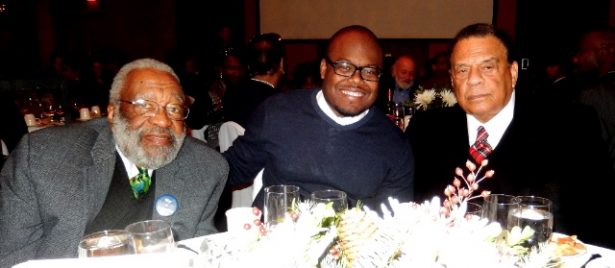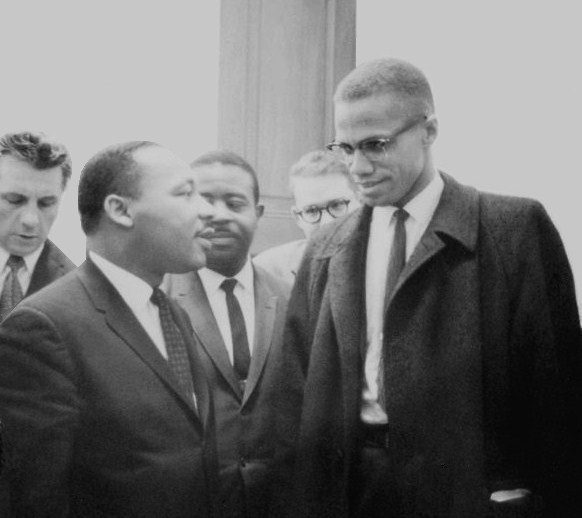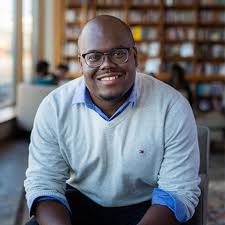To focus one’s energy on the failures of the movement is to miss the fact that the civil rights movement was never responsible for our problems…
In the Spring of 2012, I had the honor of assisting the late Vincent Harding — a historian, veteran of the civil rights movement, and beloved mentor to many — in teaching a course at Morehouse College titled “The Last Years of Martin Luther King Jr.’s Life and the Future of American Democracy.” For nine weeks, I was able to watch Harding attempt to distill not only the history of the movement — its key dates, places and legislative goals — but, more importantly, the meaning of the movement for the people involved and the country as a whole.
He would not do this alone. Modeling one of his lessons on the importance of community, he often invited other civil rights veterans to speak about the transformative experience of the movement. Aljosie Knight Harding, Quentin Samuels, and I would complete the teaching team that helped distill these stories. It felt like an important moment. For one thing, Trayvon Martin was killed just as the course began, and people were still hurt and angry.
There was a gap that was on display — not just in the classroom, but in the black community at large. We all had to deal with the fact that the lives of our students, like many young black men and women, were shaped as much by what the civil rights movement did not accomplish as they were by what it had. This gap is something I still encounter in conversations among activists and organizers — not only in the United States, but also around the world. I think it is exacerbated by things about the movement that too many of us still don’t understand.
The persistent lack of equity, persistent discrimination and dehumanization of black and brown people is all rather crushing in the wake of all that was sacrificed in the 1960s.
Michael Brown was still alive in 2012, and the Ferguson uprisings had not yet occurred. What we talked about in that room over those weeks prepared us for the years ahead. It was the gap that would again be on display in Ferguson in 2014. The gains of the civil rights movement gave way to yet another form of social control and state-sanctioned violence in the forms of mass incarceration and police killing. The persistent lack of equity, persistent discrimination and dehumanization of black and brown people is all rather crushing in the wake of all that was sacrificed in the 1960s.
That frustration has led too many to talk about “the failures of the civil rights movement” in a way that I have come to find quite disturbing. I understand the allure of talking about the movement as having failed. It is in part a response to people who try to insist that everything should be better now, that the 1965 Civil Rights Act defeated racism. That has been, after all, the official narrative taught in public schools. For many, that narrative breeds resentment, and that resentment somehow manifests itself as a criticism of the movement.
Describing the failures of the civil rights movement — as well as attacking King and the nonviolent struggle — can have a soothing effect precisely because his legacy is so easily juxtaposed with gains that seem remote and the all too potent experiences of racism in our lives. People who seem incapable of dealing with the reality of injustice today use King’s image in ways that are both ahistorical and de-contextual. Nonviolence has too often become an expectation imposed on the powerless by the powerful, and King’s name is evoked in order to do so. As a result, describing the failures of the civil rights movement is a way to lash back, and repudiating King is a way to show one’s self as more radical.
All of this perpetuates ignorance about both King and the movement he came to represent. What’s more, it’s just simply misdirected. To focus one’s energy on the failures of the movement is to miss the fact that the civil rights movement was never responsible for our problems: White supremacy was and still is. The movement was an attempt to confront white supremacy and the problems it caused.
While the elders I’ve come to know sometimes use the world failure when grieving for the suffering we still must confront, they are far more likely to express a profoundly radical commitment to hope….To them, the suffering experienced today is not a failure of past movements, but rather the “work we have yet to do.”
While the elders I’ve come to know sometimes use the world failure when grieving for the suffering we still must confront, they are far more likely to express a profoundly radical commitment to hope. These are people who have bled, who have been beaten and who have watched their friends get murdered on a scale incomprehensible to many of us now. To them, the suffering experienced today is not a failure of past movements, but rather the “work we have yet to do.”

At an award ceremony years ago, while looking at his peers Andrew Young and Dorothy Cotton, Harding told me,
“You’ve got to be prepared for the long haul. You’ve got to surround yourself with people you can be in the struggle with for 50 years.”
What he didn’t say at that moment — but what I understood being among people forced to grieve the loss of their beloved brother Martin — was that you may not make it that long. You may be shot down by an assassin while you’re young and, for that matter, you may be imprisoned and beaten. The repression may become so difficult that you flee to Cuba, or it may cost you your sanity. I knew that this was what was also meant by “You’ve got to be prepared for the long haul.”
To describe something as a failure is to concede that there was a vantage point and narrative embraced by perhaps the country at large — that we had reached some point of achievement where we could sit, rest, celebrate, and evaluate. This narrative was never represented by the lives of Vincent Harding, Bob Moses, Ruby Sales, Grace Lee Boggs, and many of their peers who joined us at Morehouse. If one considers it carefully, how could it be? You don’t go from watching so many of your friends suffer and be killed to acquiescing to a status quo. If you do, it’s a result of severe trauma.
In 1968, many watched their friend, whom they loved, be gunned down. They witnessed and endured the massive FBI assault on the movement that was COINTELPRO. They watched the backlash against all the progressive forces that would move the country decisively to the right in the Reagan years. But none of them stopped fighting.
Among the most important lessons I learned about King … is that you need to understand the movement he came to represent in order to understand him and his legacy. In fact, we dishonor him if we celebrate him out of the context of the movement that produced him.
Among the most important lessons I learned about King from those who knew him is that you need to understand the movement he came to represent in order to understand him and his legacy. In fact, we dishonor him if we celebrate him out of the context of the movement that produced him. The people around him, singing and marching hand-in-hand towards armed policemen, water canons and dogs sent to attack them, give definition to the person we celebrate. That movement — commonly called the American civil rights movement — was actually just one moment in a centuries-old struggle for freedom and dignity stretching back to when the first Africans were enslaved and brought to the “New World.” In recognition of this history, Harding was reluctant to call the struggle in the 1950s and ’60s the civil rights movement. He saw it not as some clearly defined and unique moment of history, but rather as another chapter in a series of moments in world history, where the people Europeans sought to colonize and enslave decided to resist — sometimes en masse, sometimes in individual acts of conscience, dignity, and defiance. It is more accurate to describe it as the “black freedom struggle.”
Understanding that sense of continuity helps one appreciate the fact that King existed not just because of the courage of his mother and father, but because of the courage of black teachers, barbers, mechanics, nurses, and lawyers in Atlanta. They created the community that produced the man who King would become. If one understands the black freedom struggle in the United States, then one gains a sense of appreciation for how King’s radical thought came to be. It was all made possible by the courage and hope of everyday people.
If one considers carefully the inhumanity of the segregated Southern United States, one realizes the defiance that mere survival sometimes required. In an environment where the world around you is convinced that you are less than human — and meant to be the permanent servant class of the nation — the small things you do to assert your humanity can require tremendous bravery. Daring to learn, daring to send your children to school, daring to aspire to something more than the circumstances into which you were born could be punished with death.
White supremacy was enforced with brutal terrorism. In 1906, just over 10 years before King was born, Atlanta’s black community experienced a horrendous massacre when white mobs descended on black neighborhoods killing 24 people and injuring several others. The memory of this massacre loomed large in Atlanta’s black community and, without doubt, it impacted King’s parents and the community around him. And yet, it was in this environment that parents chose to send their children to school and taught them not to believe themselves to be inferior.
As a result, King’s ideas and insights were shaped in conversation with those who came before him. There were the well-known names like the abolitionists Sojourner Truth and Frederick Douglass, as well as people like W.E.B. Du Bois, who had already left the United States for Ghana, believing it to be irredeemable. King also had his father’s contemporaries, including his mentor Howard Thurman. I am confident there were also the minor legends of church mothers and deacons at Ebenezer and Bethel A.M.E., and at the barber shop around the corner, which no doubt impressed upon him a sense of memory and continuity.
The Martin Luther King Jr. we know — the preacher, scholar of Hegel, and movement leader — had his ideas tested in conversation with his contemporaries in the black freedom struggle. There were people like Ella Baker, a remarkable organizer who challenged sexism within King’s organization. At the same time, younger people in the movement often pushed King to do more, or say more. He had a deep love and appreciation for the Student Nonviolent Coordinating Committee workers and would express this often, rarely uttering a critical world in public.
I believe King’s commitment to humanity grew out of his love for black people and existed because of the love he received from black people.
King’s critics contributed to his development as a leader and strategist, including Malcolm X, who is too often contrasted with him, as if they were polar opposites; they were not. Such a contrast often ignores the broader movement and the underlying point that both men, more than any differences between them, wanted to end the suffering of their people.

King is often celebrated for his commitment to nonviolence, peace, and many other things. Yet, people seem reticent to celebrate the fact that King was committed to black lives and the fullness of black life, and there is something pernicious about this reticence. The choice to emphasize King’s universal relevance is often made as if a commitment to black life in some way conflicts with a commitment to humankind. I believe King’s commitment to humanity grew out of his love for black people and existed because of the love he received from black people. Using the language of the struggle today, it is because black lives mattered to him that he understood all lives matter. Without belief in the former, it is impossible for anyone to proclaim the latter.
King was the transformative leader that he was because of the courage of those around him, and because he was humble enough to allow them to challenge and shape him. He came to understand that his own life was one to be lived in service to the beloved community, and he gave himself to the struggle.
During those classes in the Spring of 2012, Harding painted for us a picture of the grief that was felt at the moment of the assassination. It is not difficult to imagine the pain felt by Coretta and their children. Many have spoken about the funeral and all who came. Images show footage of the people we think of as celebrities in a way that may obscure the pain they felt — people like Harry Belafonte or Mahalia Jackson. Harding felt it was important for us to also see another image: He painted for us the picture of the people who poured into the streets to watch the mule carrying King’s body down Auburn Avenue, along with the ordinary men and women who streamed into Sisters Chapel at Spelman College throughout the day and deep into the night to weep, wail, and to say goodbye. The murder hurt in a particular way that seems difficult to describe, but I think the feeling is accessible even to those of us who were not yet born. It was the death of hope. It was clear that bullet was meant for us, all of us who dared.
King was not the last one of us to be killed in the struggle; others were yet to die. In the subsequent years, those who opposed the movement succeeded in stopping the marches and in confusing, co-opting, and obfuscating organizations and activists. Some veterans may blame themselves for letting that happen, but the assault was massive and unparalleled. I don’t have enough hubris to be critical of those facing such an assault.
If hope died that day, it should not be lost on us that King was someone who believed in resurrection.
If hope died that day, it should not be lost on us that King was someone who believed in resurrection. Nelson Mandela would tell the world years later that the journey towards freedom is a long one. Harding used to echo that sentiment in a variety of ways. The bullet that rang out at the Lorraine Motel that fateful day in Memphis simply wasn’t powerful enough stop that journey. If the gunman had understood who King had come from, he might have known that. Our ancestors have given us far too much momentum and too much resilience to stop us so easily.
There are important criticisms about class and gender to be made, many of which were also made at the time. I’m not attempting to disparage any of that. Unearthing those critiques and amplifying forgotten voices is part of telling the truth about what happened. But there is a tendency to want to define efforts today in contrast to earlier manifestations of the struggle, rather than in continuity. This is done, in part, by attacking nonviolence and spreading the false narrative that its champions, our elders in the civil rights movement, failed.
I will never forget the eloquence of veteran SNCC activist Gwendolyn Zoharah Simmons’ response to a young brother in Brussels when he proclaimed “the fact that you used nonviolence is the reason why police are still killing you today.” With, calm, grace and precision she told him:
“Most of us chose nonviolence because when you love the people you are organizing, you don’t want to see them hurt, or killed.”
This statement was more than just a concession to the superior weaponry of the Jim Crow state; it is a testament to where the struggle began and must always begin: in love.
It is a radical commitment to a life of struggle for a goal we may never see. I bear witness to the fact that many never stopped, and I give thanks to them for that.
The long haul means that at one point we may be marching and at one point we may be teaching. It is a radical commitment to a life of struggle for a goal we may never see. I bear witness to the fact that many never stopped, and I give thanks to them for that. They didn’t fail us. The United States failed us, laws failed us, humanity may have failed us, God may even have failed us, but those who participated in what’s called the civil rights movement didn’t fail us. Let’s not speak as if they did. Vincent Harding joined the ancestors in 2014, and we’ve lost many others since. It’s up to us now to continue, and we’ve got to be community to each other for the long haul, however long that may be.
This essay was originally published on Waging Nonviolence. It is reprinted here with permission.

Lucas Johnson serves as Executive Director of On Being’s Civil Conversations Project (CCP) and is a former leader of the International Fellowship of Reconciliation (IFOR), the world’s oldest interfaith peace organization. Lucas has deep, global experience in conflict resolution and community organizing. He has been shaped by his time learning from veterans of the Civil Rights Movement in the U.S., most closely Vincent Harding and Dorothy Cotton, and by his work with human rights activists around the world, especially in Africa, Europe, and Latin America.
As part of his work with IFOR, Lucas incubated a Beloved Communities Project in Germany, Italy, the Netherlands, and Belgium; and helped to create an Ethics of Reciprocity initiative with the United Nations. He will draw on and extend this work through CCP.
In September 2019, Lucas joined us as a panelist in Radical Aliveness and Belonging: Exploring the Intersections of Spirituality and Social Change, a symposium co-sponsored by A Network for Grateful Living and SCUA UMass Amherst.
